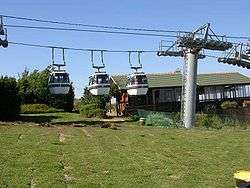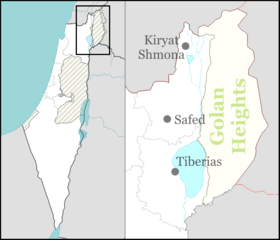Manara, Israel
Menara (Hebrew: מְנָרָה) is a kibbutz in northern Israel. Located in the Upper Galilee adjacent to the Lebanese border and overlooking the Hula Valley, it falls under the jurisdiction of Upper Galilee Regional Council. In 2019 it had a population of 248.[1]
Menara מְנָרָה | |
|---|---|
 | |
 Menara | |
| Coordinates: 33°11′45″N 35°32′40″E | |
| Country | Israel |
| District | Northern |
| Council | Upper Galilee |
| Affiliation | Kibbutz Movement |
| Founded | 1943 |
| Founded by | HaNoar HaOved VeHaLomed members |
| Population (2019)[1] | 248 |
| Website | www.manara.co.il |
History
The kibbutz was established in 1943 by members of the HaNoar HaOved VeHaLomed youth group, and other young immigrants from Germany and Poland. At one point the kibbutz was renamed Ramim (Hebrew: רמים, lit. Tall ones) in an attempt to replace its Arabic name (Manara derives from Minaret) with a Hebrew one. However, the new name failed to take hold amongst local residents. The kibbutz then came to a settlement with the government whereby the name Menara, with an accent on the last syllable (a Hebraicized form of Manara, accented on the second syllable) would be made official.


In June, 1948, the kibbutz requested land from the newly depopulated Palestinian village of Qadas, as it was "suitable for winter crops."[2]
Leon Uris visited the kibbutz while researching his novel, Exodus. Former Prime Minister Yitzhak Rabin's sister Rachel Ya'akov was a founding member.[3]
As Manara lies less than 100 metres from the Lebanese border, problems have arisen during fighting between the two countries. The Menara bypass project was completed in 2005 to provide safe access to the kibbutz.
Manara is boasted to be 888 metres above sea level and is a rare style for a kibbutz, with apartments providing the accommodation, due to the limited space.
Economy
Manara's main industries are agriculture (primarily cotton fields, apples and chickens), tourism to the scenic cliffs via its cable cars descending to Kiryat Shmona in the valley below, and a technical glass manufacturing plant.
See also
References
- "Population in the Localities 2019" (XLS). Israel Central Bureau of Statistics. Retrieved 16 August 2020.
- Morris, Benny (2004). The Birth of the Palestinian Refugee Problem Revisited. Cambridge University Press. p. 363, note #130, p. 402. ISBN 978-0-521-00967-6.
- Veteran kibbutz goes private Israel HaYom, 12 August 2011